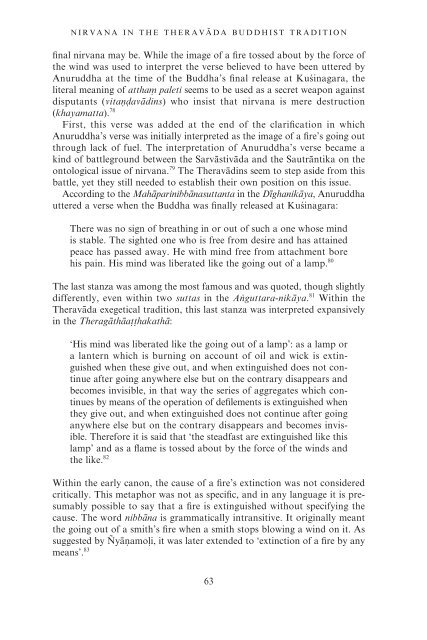Metaphor and Literalism in Buddhism: The ... - misterdanger.net
Metaphor and Literalism in Buddhism: The ... - misterdanger.net
Metaphor and Literalism in Buddhism: The ... - misterdanger.net
You also want an ePaper? Increase the reach of your titles
YUMPU automatically turns print PDFs into web optimized ePapers that Google loves.
NIRVANA IN THE THERAVf DA BUDDHIST TRADITION<br />
f<strong>in</strong>al nirvana may be. While the image of a fire tossed about by the force of<br />
the w<strong>in</strong>d was used to <strong>in</strong>terpret the verse believed to have been uttered by<br />
Anuruddha at the time of the Buddha’s f<strong>in</strong>al release at Kuu<strong>in</strong>agara, the<br />
literal mean<strong>in</strong>g of atthaN paleti seems to be used as a secret weapon aga<strong>in</strong>st<br />
disputants (vitaOSavAd<strong>in</strong>s) who <strong>in</strong>sist that nirvana is mere destruction<br />
(khayamatta). 78<br />
First, this verse was added at the end of the clarification <strong>in</strong> which<br />
Anuruddha’s verse was <strong>in</strong>itially <strong>in</strong>terpreted as the image of a fire’s go<strong>in</strong>g out<br />
through lack of fuel. <strong>The</strong> <strong>in</strong>terpretation of Anuruddha’s verse became a<br />
k<strong>in</strong>d of battleground between the Sarvastivada <strong>and</strong> the Sautrantika on the<br />
ontological issue of nirvana. 79 <strong>The</strong> <strong>The</strong>ravad<strong>in</strong>s seem to step aside from this<br />
battle, yet they still needed to establish their own position on this issue.<br />
Accord<strong>in</strong>g to the MahApar<strong>in</strong>ibbAnasuttanta <strong>in</strong> the DCghanikAya, Anuruddha<br />
uttered a verse when the Buddha was f<strong>in</strong>ally released at Kuu<strong>in</strong>agara:<br />
<strong>The</strong>re was no sign of breath<strong>in</strong>g <strong>in</strong> or out of such a one whose m<strong>in</strong>d<br />
is stable. <strong>The</strong> sighted one who is free from desire <strong>and</strong> has atta<strong>in</strong>ed<br />
peace has passed away. He with m<strong>in</strong>d free from attachment bore<br />
his pa<strong>in</strong>. His m<strong>in</strong>d was liberated like the go<strong>in</strong>g out of a lamp. 80<br />
<strong>The</strong> last stanza was among the most famous <strong>and</strong> was quoted, though slightly<br />
differently, even with<strong>in</strong> two suttas <strong>in</strong> the AWguttara-nikAya. 81 With<strong>in</strong> the<br />
<strong>The</strong>ravada exegetical tradition, this last stanza was <strong>in</strong>terpreted expansively<br />
<strong>in</strong> the <strong>The</strong>ragAthAaMMhakathA:<br />
‘His m<strong>in</strong>d was liberated like the go<strong>in</strong>g out of a lamp’: as a lamp or<br />
a lantern which is burn<strong>in</strong>g on account of oil <strong>and</strong> wick is ext<strong>in</strong>guished<br />
when these give out, <strong>and</strong> when ext<strong>in</strong>guished does not cont<strong>in</strong>ue<br />
after go<strong>in</strong>g anywhere else but on the contrary disappears <strong>and</strong><br />
becomes <strong>in</strong>visible, <strong>in</strong> that way the series of aggregates which cont<strong>in</strong>ues<br />
by means of the operation of defilements is ext<strong>in</strong>guished when<br />
they give out, <strong>and</strong> when ext<strong>in</strong>guished does not cont<strong>in</strong>ue after go<strong>in</strong>g<br />
anywhere else but on the contrary disappears <strong>and</strong> becomes <strong>in</strong>visible.<br />
<strong>The</strong>refore it is said that ‘the steadfast are ext<strong>in</strong>guished like this<br />
lamp’ <strong>and</strong> as a flame is tossed about by the force of the w<strong>in</strong>ds <strong>and</strong><br />
the like. 82<br />
With<strong>in</strong> the early canon, the cause of a fire’s ext<strong>in</strong>ction was not considered<br />
critically. This metaphor was not as specific, <strong>and</strong> <strong>in</strong> any language it is presumably<br />
possible to say that a fire is ext<strong>in</strong>guished without specify<strong>in</strong>g the<br />
cause. <strong>The</strong> word nibbAna is grammatically <strong>in</strong>transitive. It orig<strong>in</strong>ally meant<br />
the go<strong>in</strong>g out of a smith’s fire when a smith stops blow<strong>in</strong>g a w<strong>in</strong>d on it. As<br />
suggested by Ñyaoamoti, it was later extended to ‘ext<strong>in</strong>ction of a fire by any<br />
means’. 83<br />
63











